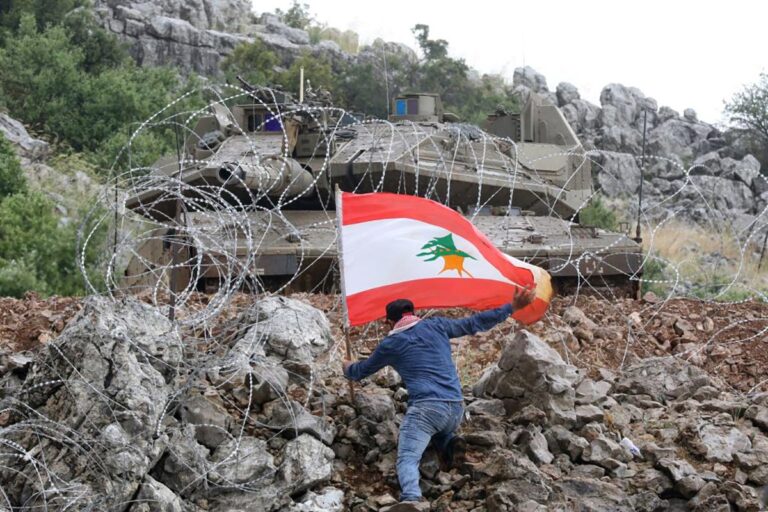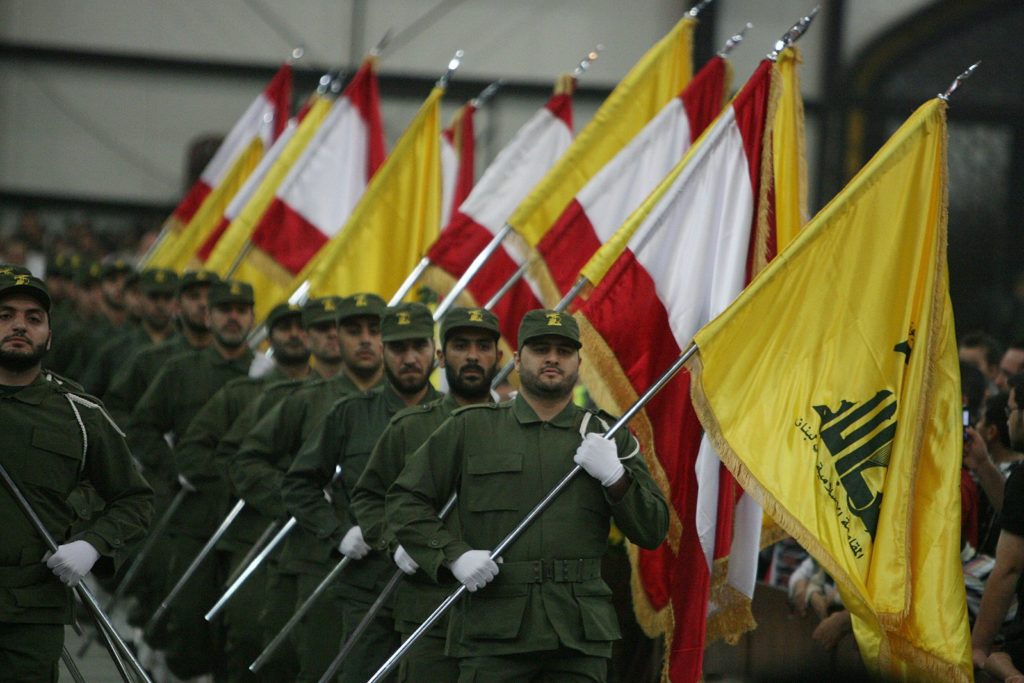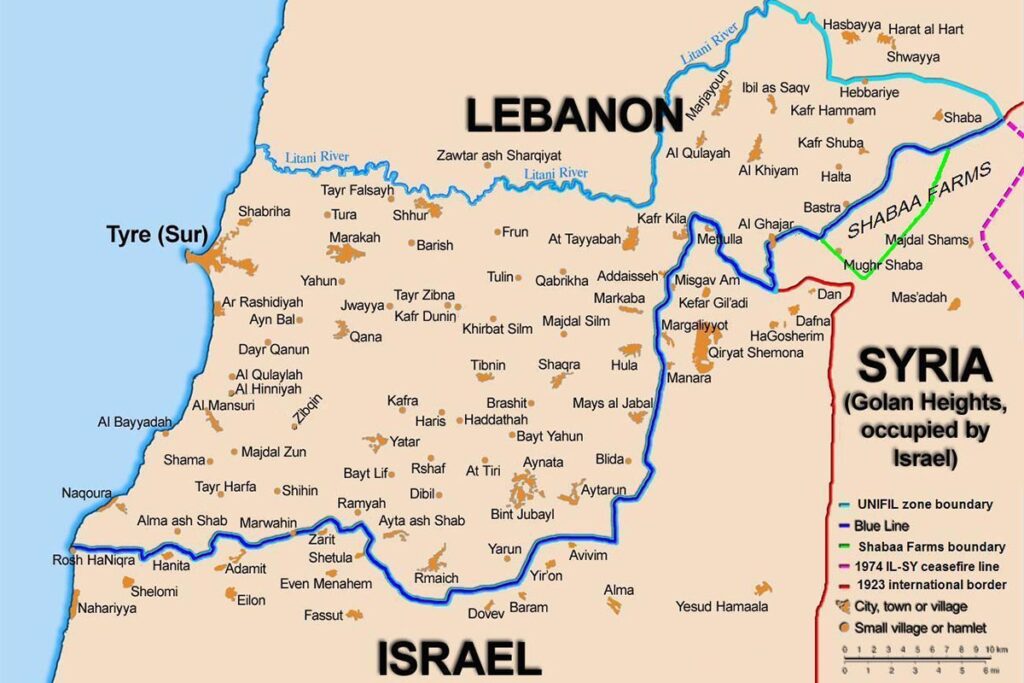
In recent weeks, news sites have been full of headlines concerning a tent Hezbollah placed in the contested Shebaa Farms area between Israel and Lebanon, prompting threats of war from leaders of both countries. So, what’s the fuss about a simple tent that’s driving tensions between these nations?
Israel and Lebanon: A rocky history
To answer that question, you need to understand the tumultuous history between Israel and Lebanon. Israel shares its northern border with two countries: Lebanon and Syria.
Israel hasn’t been in an all-out conflict with Syria since the Yom Kippur War in 1973. However, Israel has clashed with groups in Lebanon repeatedly in the past few decades, starting with the First Lebanon War in 1982. During this war, the IDF invaded southern Lebanon in response to repeated attacks by Palestinian militants from Lebanon.
Soon after the war, Hezbollah emerged, formed from a coalition of Shiite militias. Its primary objective was to fight against the Israeli invasion of southern Lebanon. By the 1990s, Hezbollah expanded its influence, venturing into politics. Today, Hezbollah is a significant force in Lebanese politics with solid support from Lebanon’s Shiite community.

In 2000, the IDF finally withdrew from southern Lebanon, adhering to a boundary created by the United Nations known as the “Blue Line.” But this move did not bring an end to the conflict with Hezbollah. Cross-border raids persisted, along with rocket and anti-tank missile attacks on Israeli forces. The IDF, in return, often launched airstrikes in Lebanon.
In 2006, tensions flared once again. Hezbollah fired rockets into northern Israel and ambushed an IDF patrol, kidnapping two soldiers. Hezbollah claimed this move was a strategy to get Israel to free Lebanese prisoners in exchange for the captured soldiers. The IDF responded with airstrikes and the situation escalated into the Second Lebanon War.
Since 2006, tensions with Hezbollah have ebbed and flowed, occasionally leading to exchanges of fire along the Lebanese border. However, 2023 has marked a significant rise in this tension. So much so that experts say Israel is the closest to war with Hezbollah it has been since 2006.
Who is Hezbollah?
Understanding Hezbollah is pivotal to comprehending the intricate dynamics between Lebanon and Israel. So, who exactly is Hezbollah, and why have they remained a significant and controversial figure in the Lebanese-Israeli relationship?
Hezbollah (which means “Party of God” in Arabic) originated in Lebanon in 1982. With strong backing from Iran and Syria, one of the organization’s foundational goals is the destruction of Israel. Their 1985 manifesto not only called for the creation of an Islamic Republic in Lebanon but also stated, “Our struggle will end only when this entity [Israel] is obliterated.”
The group has orchestrated several devastating attacks against Jews worldwide, including a bus bombing targeting Israeli tourists in Bulgaria and a strike on a Jewish community center in Buenos Aires, claiming 85 lives.
Despite its terrorist activities, Hezbollah has attempted to rebrand itself as a political party, offering social services to its constituents including infrastructure, healthcare, and education, earning substantial support from Lebanon’s Shiite community.
Many countries, including the U.S., Canada, the United Kingdom, and Israel, consider Hezbollah to be a terrorist organization, while the European Union only designates its military wing as a terrorist group.
With an understanding of Hezbollah’s motivations and history, it becomes clearer why recent events between Lebanon and Israel are cause for concern.
Recent tensions between Israel and Lebanon
So, what led to the current tensions, including the tent situation? The escalation can be traced back to a sequence of notable incidents over the past few months.
First, in early March, an armed individual managed to cross the Lebanese border undetected, traveling 37 miles to the Meggido Junction, where he set off a roadside bomb, seriously injuring an Israeli citizen.
The IDF later neutralized this assailant, who was wearing an explosive belt, adding to the gravity of the situation. Though no group openly claimed responsibility, Israel’s defense community largely suspects that Hezbollah either carried out or facilitated the attack.
The situation escalated further in April when a barrage of 34 rockets was fired from southern Lebanon toward Israel. Although the rockets were likely fired by a Palestinian group, Israeli defense experts believe that Hezbollah had sanctioned it. The IDF responded with airstrikes targeting the rocket launch sites.
In June, Hezbollah intensified their activities at the border, expressing outrage at Israeli efforts to build a security barrier along the border. They organized demonstrations in the contentious Shebaa Farms area, leading to confrontations with the IDF. On multiple occasions, this escalated to the point that Lebanese and IDF soldiers directed weapons at each other, although they did not fire.
The tent that’s stirring tensions: Hezbollah’s border statement
Amid these demonstrations, Hezbollah quietly made a symbolic move which they later said was a response to the construction of the security barrier. They erected two tents on the Israeli side of the Blue Line in the disputed Shebaa Farms territory. Although one of the tents was eventually taken down, the other remains — a reminder of the ongoing conflict.
Hezbollah has stopped consistently manning the tent in the last few days that was set up in the Israeli territory opposite Har Dov about 50 meters from the border with Lebanon.#Lebanon | #Israel https://t.co/BomX0yuM1W
— The Jerusalem Post (@Jerusalem_Post) August 12, 2023
The Shebaa Farms, located at the intersection of the Israeli, Lebanese, and Syrian borders, have been a consistent source of tensions since Israel’s withdrawal from southern Lebanon. Hezbollah and the Lebanese government claim that the area belongs to Lebanon. Israel, meanwhile, maintains that the land became Israeli territory after capturing it from Syria during the Six-Day War.
The UN’s stance is that the land was originally under Syrian control and that any dispute concerning it must be settled between Lebanon and Syria, as the two countries have never reached an agreement concerning where their shared border is.
Since the tents were put up, tensions have only risen and Hezbollah activists and Lebanese citizens and journalists have continued to near and cross the Blue Line.

In early July, two anti-tank missiles were fired toward an IDF patrol. No group has claimed responsibility for the missile fire, but the defense community in Israel estimates that a Palestinian group was likely behind the attack.
Later in July, Hezbollah’s leader, Hassan Nasrallah, gave a provocative speech in which he asserted that the tent was squarely in Lebanese, not Israeli territory. He also demanded that Israel withdraw from any disputed areas along the Blue Line, including the Shebaa Farms.
As tensions continue to escalate, the tent remains a symbol of unresolved territorial disputes and the deeper, long-standing animosities between Israel and Hezbollah.
Is Israel about to go to war? It depends on who you ask.
Israeli officials weigh in: While Israeli officials have somewhat downplayed the significance of the tent, they have also warned of a response if it is not removed.
The IDF spokesperson, Daniel Hagari, referred to the tent as a “relatively marginal provocation” and the head of Israel’s National Security Council, Tzachi Hanegbi, called it “child’s play.” However, Hanegbi also added that the tent will be “responded to in due course.”
Israel’s Defense Minister Yoav Gallant has reportedly stated that the tent does not pose a security risk, adding that Israel will act at the time and in the way it chooses.
Despite these comments, government sources told the Israeli newspaper Israel Hayom that Israel has “no intention to neglect the handling of the incident.”
The sources added that Israel’s defense policy is not to be pulled into escalations initiated by its enemies. They pointed to a recent operation Israel launched in the Gaza Strip as a surprise attack, suggesting it could hint at Israel’s potential actions regarding the tent.
Underlying causes for tension: However, the tent is only part of the issue. Israel’s defense community has noted that Hezbollah is gaining confidence to act more directly due to the political and societal crisis surrounding the judicial reform, as well as the decisions of many IDF volunteer reservists to end their volunteer service due to the reform.
Nasrallah hinted at this in a speech he gave in recent weeks, saying, “If the Israeli enemy were as it was before, and would have simply bombed the tent, it would not have been erected. But now the situation has changed and the Israelis did not dare to take a step in the field.”
Hezbollah’s motivations might not only be rooted in their perception of a shifting balance of power with Israel. The ongoing economic and political crisis in Lebanon is also influencing their actions. In July, a Hezbollah-affiliated cleric, Sheikh Sadiq al-Nabulsi, stated in a television interview that “a war with Israel can deliver us from our crisis.”
The bigger picture: Both Israeli and Lebanese analysts have theorized that Hezbollah hopes to push Israel into negotiations concerning the land border.
Army Radio reported that Nasrallah is concerned that the security barrier being built by Israel will “establish facts on the ground” concerning the border, especially in disputed areas. Israeli officials have reportedly expressed openness to starting negotiations on the border, but have insisted that such negotiations can only take place after Hezbollah removes the tent from the Shebaa Farms.
With these factors in consideration, Israeli defense analysts have concluded that, while Israel is not interested in entering a conflict with Hezbollah, Nasrallah seems more inclined toward escalation than in the past, and “one wrong move” could plunge the region into war.
The Israeli newspaper Maariv recently reported that the assessment in Israel is that Hezbollah and Israel are not “on the eve of war.” However, the defense establishment is concerned that as Israel continues to advance in its construction of the security barrier, Hezbollah will advance to more violent actions which could easily deteriorate the situation.
Originally Published Aug 14, 2023 06:42PM EDT


